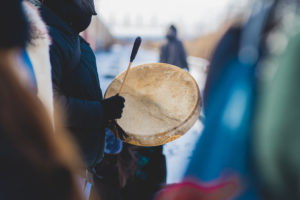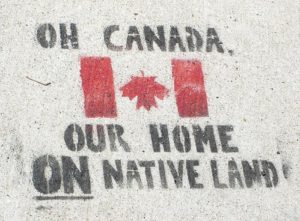I was very sad to miss the workshops and speakers on the Indigenous Professional Development Day on September 25 but was thankful for the opportunity to continue learning via asynchronous tasks. The podcast Think Indigenous is a mini-series collection of indigenous perspectives on education. Through listening to various talks from someone who is a doctoral candidate to an individual invited to speak to bring in a younger voice, I was able to gain knowledge and insight through a different lens on what is wrong with the western education system. It is so difficult to pick just one thing I learned because every speaker gave me something new to think about so I am going to structure this blog with a few different ideas and how I can integrate them into teaching.
The first presenter I listened to described the need for Indigenous immersion schools versus the current bilingual programming because 30 minutes a day to learn another culture and language is not sufficient. There is a bravery required to continue pressuring schools into the idea of immersion schools as well as time being put into developing programs. These facts need to be voiced through a variety of platforms because then it becomes common knowledge and more educators can learn from this and change there teaching to not just “include” Indigenous content but to build lesson plans on different ideals and knowledge.
One common thread among all the speakers was that they taught through the telling of stories. Song and ceremonies are essentially the curriculum and it is not a faith or religion that it being taught but way of life and kinship. The second speaker I listened to highlighted the importance of stories and how there is a placebo versus a no-cebo effect on people if you tell yourself a story and believe it you will heal yourself but if you have a negative story and believe it then you will become that story and you put yourself as a victim, you will become sick or in bad fortune. If you are in touch with your body, this would not be an unknown fact because a healthy, positive, and open mindset is what your life will manifest. While children in K-12 are still learning they are also still trying to figure their identity and who they are as a person. The lesson that I was able to grasp from the speakers of this podcast was how important stories and a positive mindset are, not only as a way of teaching but as a way of finding yourself and thus forging a positive life path for yourself.
In my future classroom I aim to not only have a positive atmosphere but from the beginning of my practicum I will encourage the learners to write down positive affirmations for themselves and as an exercise have them weave that positive affirmation into a story of their choosing. For example if a student chose “ I will not fret over things I cannot control” I will have them write a paragraph or so not about things they cannot control but things they CAN control and have them try and change the negative mindset. Harold Johnson is the speaker from the miniseries that said “It is time to re-write stories” referring to individuals who have a victim mindset and therefore one that is negative.
When listening to all of the speakers, it made me think about how much the program at UNBC was needed 20, 30, 40 , 50 years ago and it makes me not only proud to be a part of this much needed system of education shift but also makes me disappointed in Canada’s past actions. As I am gathering more and more knowledge my motivation grows so that I can be an educator that can successfully build awareness in future learners.

